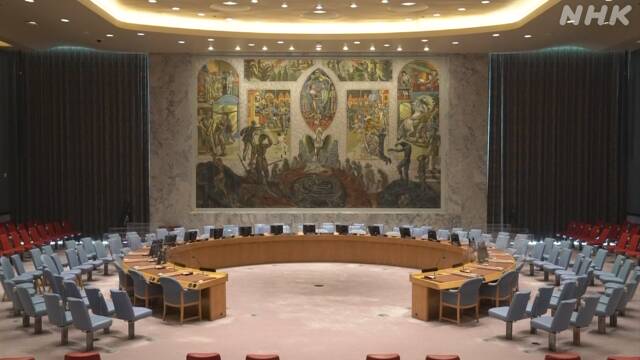Japan will become a non-permanent member of the United Nations Security Council for two years from 2023.
In January, he will also serve as the chair country, and will be forced to navigate a difficult situation amidst conflicts between major powers over the situation in Ukraine and North Korea, and the Security Council becoming dysfunctional.
The Security Council of the United Nations consists of 15 countries, including ▽
5 permanent members such as the United States and Russia, and
▽ 10 non-permanent members elected by region with terms of 2 years. He will serve as a non-permanent member for two years from 2023.
This is the 12th time that Japan has become a non-permanent member of the UN Security Council, the most of any member state of the United Nations.
As the chair country, Japan will hold a ministerial-level public debate on the theme of the "rule of law," with Foreign Minister Hayashi scheduled to attend.
Since Russia's military invasion of Ukraine in February last year, the Security Council has been in sharp conflict with Russia, as a permanent member of the Security Council has exercised its veto power to reject resolutions submitted by Western countries.
In addition, the United States and Europe, which are demanding stronger sanctions, and China and Russia, which oppose North Korea, are in conflict with North Korea, which has repeatedly launched ballistic missiles. criticized.
Japan, which has the most experience as a non-permanent member of the Security Council, will be asked what kind of role it can play in the Security Council, which is responsible for the peace and stability of the international community.
Ambassador Ishikane, Permanent Mission of Japan to the United Nations: “What we can do now is prepare for peace”
Ambassador Kimihiro Ishikane of the Permanent Mission of Japan to the United Nations gave an interview to NHK prior to his presidency of the Security Council.
Ambassador Ishikane commented on the current situation of the Security Council, saying, "Unfortunately, the Security Council has not been able to express its unified intentions due to the war in Ukraine, nor has it been able to take effective measures. What we can do now is to prepare for the peace that should be realized in the future."
Regarding specific initiatives as the chair country, he said, "I think the first thing is to clarify how the current conflict is viewed. International law and the United Nations Charter that 'the sovereignty of an independent country must not be violated.' The most important point is that Russia has violated the most important principle, and it is a ``challenge to the rule of law.'' It is important to firmly establish and deepen this recognition.The rule of law is a common denominator in the international community. It would be great if it could emerge that it is important as an infrastructure," he said, emphasizing the significance of holding public debates on the theme of "the rule of law."
Regarding the deepening division of the international community, he said, "Each is a sovereign state and has its own way of thinking. Regarding the war in Ukraine, countries with historical ties, food, energy and economic ties with Russia. With that in mind, it is also extremely important to listen to the various issues facing each country and work hard together to think about what the Security Council can do." He expressed his intention to work so that many countries can come together through dialogue.
Regarding North Korea, which has repeatedly launched ballistic missiles, "In the discussions so far, there has been a gradual consensus on the point that North Korea's actions violate UN Security Council resolutions and that a unified message should be sent to North Korea." Japan would like to make a firm appeal to the members of the Security Council that the North Korean issue is a problem of the international community that transcends regions."
In addition, Ambassador Ishikane said, "Seventy to eighty percent of the Security Council's agenda consists of problems in Africa and the Middle East. There is no doubt that the Security Council will make steady efforts to save the lives of those who are suffering and those who are being sacrificed. We must continue to do so,” he said, emphasizing that as a member of the Security Council, it is necessary to firmly respond not only to the situation in Ukraine and North Korea, but also to conflicts around the world.

